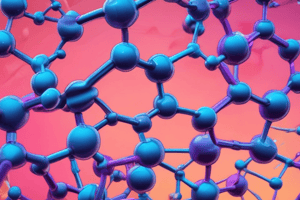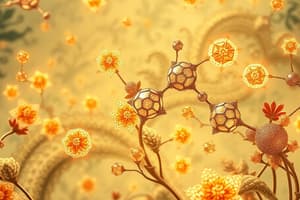Podcast
Questions and Answers
How many valence electrons does carbon have?
How many valence electrons does carbon have?
- Four (correct)
- Five
- Six
- Two
What is the main focus of Organic Chemistry?
What is the main focus of Organic Chemistry?
- Study of gases
- Study of metals
- Study of inorganic compounds
- Study of carbon compounds (correct)
Which type of bond does carbon commonly form with other atoms?
Which type of bond does carbon commonly form with other atoms?
- Metallic Bonds
- Hydrogen Bonds
- Ionic Bonds
- Covalent Bonds (correct)
What is an example of a compound that consists of carbon atoms connected by strong chemical bonds?
What is an example of a compound that consists of carbon atoms connected by strong chemical bonds?
Which class of organic compounds includes twenty different types, each serving specific functions within cells, organs, or organisms?
Which class of organic compounds includes twenty different types, each serving specific functions within cells, organs, or organisms?
What role do enzymes, made from protein chains, play in our bodies?
What role do enzymes, made from protein chains, play in our bodies?
Flashcards are hidden until you start studying
Study Notes
Organic Chemistry is a branch of science focused on carbon compounds. It's essential because these compounds form most complex molecules, including proteins, nucleic acids, carbohydrates, and lipids, which make up living things like plants and animals. Carbon has four valence electrons, meaning it can bond with other atoms easily through covalent bonds. Because of this, many large molecules contain lots of carbon atoms connected by strong chemical bonds. An example of one such compound is sugar, which consists of six carbon atoms linked together into a ring shape by oxygen atoms. Another common class of organic compounds includes amino acids, of which there are twenty different types, each serving some function within cells, organs or organisms. These chemicals interact with each other inside our bodies all day to help us live healthy lives. For instance, enzymes made from protein chains act as catalysts, speeding up reactions so we digest food faster; neurotransmitters send signals between nerve cells when they bind to receptors on those cells; hormones regulate growth processes throughout the entire body. So you see how important understanding organic chemistry really is.
Studying That Suits You
Use AI to generate personalized quizzes and flashcards to suit your learning preferences.




